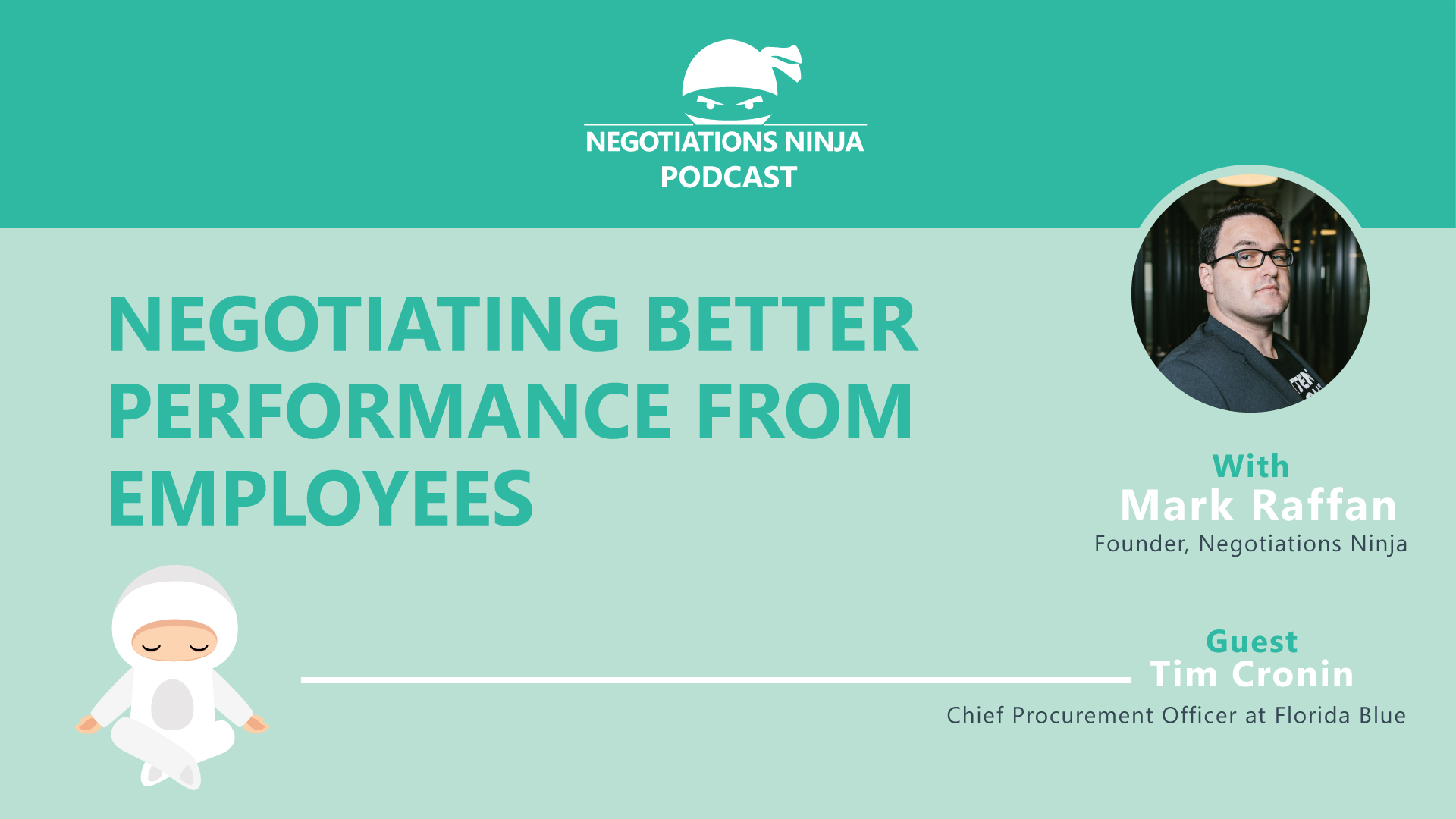How do you negotiate better performance out of your employees? Is there a way to negotiate that is respectful yet to the point? Tim Cronin—Chief Procurement Officer at Florida Blue—visited the show to discuss negotiating with your employees. In this fascinating conversation, we talk about having challenging employee discussions, aligning the business’s goals to the employee’s goals, and radical candor.
Outline of This Episode
- [2:27] Learn all about Tim Cronin
- [4:07] The performance system at Florida Blue
- [9:43] How Tim prepares for negotiation conversations
- [15:41] Navigating difficult employee conversations
- [21:00] How to negotiate better performance
[23:45] The power of authenticity in conversations - [26:27] The impact of positional power
- [32:00] How to connect with Tim Cronin
The performance system at Florida Blue: What’s in it for “we”
The performance system at Florida Blue was designed with the hope that everyone could find a purpose in the metrics and competencies and how they tie to company performance. Secondly, in every interaction, Tim looks for “we type agreements.” What does that mean?
When he works to negotiate better performance from employees, he wants to end each conversation with win-win results. It’s all about “What’s in it for ‘we?’” Once each party understands that’s the overall goal, they shift into meaningful conversations to understand what performance is, where they are on the spectrum, and how to align on goals moving forward.
They used to be a formal process-oriented company, and everyone had a scorecard with distinct metrics to define success. But ultimately, it eroded teamwork. They’ve moved toward informal conversations with employees to understand what they want from their future and to make sure they’re a good fit.
How Tim prepares for negotiation conversations
Even with informal conversations, good leaders must still prepare. At Florida Blue, they prepare for a spectrum of conversations. When it comes to performance, they try to differentiate between performance gaps and calculated risks. They want their employees to take calculated risks but to do it in a way that brings value back to the company.
Tim reveals that this ability revolves around soft skills. So they try to ensure employees work well with their peers, business partners, customers, and risk partners. They work hard as a leadership team to celebrate calculated risks, so employees know it’s fine to give it a shot. Ultimately, each conversation must always be a two-way street where each side knows what to expect.
Navigating difficult employee conversations
No one likes to get bad feedback. So Tim tries to deliver it in a way that helps the teammate understand the disconnect and what they can do to improve. He will always focus on something they’ve done well; then, he’ll share how a different action would have led to a better result. He will have the hard conversation, and he won’t sugarcoat it. But he emphasizes that you have to walk out of that room and remain teammates.
He notes that you must be descriptive and precise about where the teammate isn’t performing. The conversations aren’t always easy to have. But they try to remain positive and get everyone thinking on the same spectrum. As a leader, it’s your responsibility to share why the performance isn’t there and the path to correcting it.
The impact of positional power
Tim points out that you can’t completely remove positional power from a relationship. There’s still a hierarchy between managers and employees. But you need to know how each employee reacts to positional power and choose whether to use it or not. How do you get your point across respectfully and authentically? You can’t always talk like buddies. But when it comes down to it, you have to utilize the individual relationship you have with each person.
Florida Blue employs training and role-playing with their managers so they can learn how to negotiate better performance from their team members. It always comes down to embracing integrity and respecting the person.
How do you recover when a discussion doesn’t go well? Listen to the whole episode for more negotiation insight from Tim Cronin.
Resources & People Mentioned
- Radical Candor by Kim Scott
- Thinking in Bets by Annie Duke
Connect with Tim Cronin
- Connect on LinkedIn
Connect With Mark
- Follow Negotiations Ninja on Twitter: @NegotiationPod
- Connect with Mark on LinkedIn
- Follow Negotiations Ninja on LinkedIn
- Connect on Instagram: @NegotiationPod




